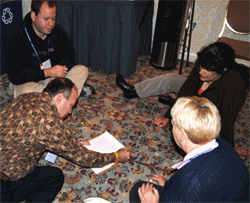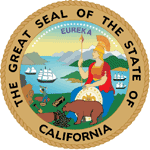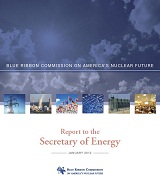Reflections on the Cedar Creek Room
 On January 19, the Federal District Court in Brattleboro, Vt., issued a court decision in favor of Entergy Corporation, regarding the continued operation of its Vermont Yankee nuclear power plant. Entergy had sued the State of Vermont on several issues, but mainly on Act 160, a Vermont law that was crafted to block the continued operation of the plant. The plant needs a Certificate of Public Good (CPG) from the state in order to keep operating, but Act 160 says that the state's Public Service Board needs legislative approval before it could release its findings on the application for the CPG. Without the new CPG, the plant would have had to shut down when the original one expires, on March 21, 2012. The federal court's decision "permanently enjoined" the state from using Act 160 to deny a CPG to Entergy; the basis for that decision is the supremacy of federal law over state law.
On January 19, the Federal District Court in Brattleboro, Vt., issued a court decision in favor of Entergy Corporation, regarding the continued operation of its Vermont Yankee nuclear power plant. Entergy had sued the State of Vermont on several issues, but mainly on Act 160, a Vermont law that was crafted to block the continued operation of the plant. The plant needs a Certificate of Public Good (CPG) from the state in order to keep operating, but Act 160 says that the state's Public Service Board needs legislative approval before it could release its findings on the application for the CPG. Without the new CPG, the plant would have had to shut down when the original one expires, on March 21, 2012. The federal court's decision "permanently enjoined" the state from using Act 160 to deny a CPG to Entergy; the basis for that decision is the supremacy of federal law over state law.

-3 2x1.jpg)
 Entergy's Vermont Yankee nuclear power plant's operating license would have expired on March 21, 2012, but the Nuclear Regulatory Commission extended the license to 2032. Vermont's legislature and a vocal part of the state's population don't like the idea of Vermont Yankee's continued operation. So, when confronted with an unpopular federal agency's decision, what's a concerned state legislature to do?
Entergy's Vermont Yankee nuclear power plant's operating license would have expired on March 21, 2012, but the Nuclear Regulatory Commission extended the license to 2032. Vermont's legislature and a vocal part of the state's population don't like the idea of Vermont Yankee's continued operation. So, when confronted with an unpopular federal agency's decision, what's a concerned state legislature to do? Soon after declaring that it would end the Yucca Mountain repository project, the Obama administration created the Blue Ribbon Commission on America's Nuclear Future to reevaluate the nation's nuclear waste program and policies. The commission was asked to recommend improvements to the waste program and the Nuclear Waste Policy Act (NWPA), and to make general recommendations on the path forward. The commission was specifically instructed to not address the Yucca Mountain project, or any specific project or site. The commission's
Soon after declaring that it would end the Yucca Mountain repository project, the Obama administration created the Blue Ribbon Commission on America's Nuclear Future to reevaluate the nation's nuclear waste program and policies. The commission was asked to recommend improvements to the waste program and the Nuclear Waste Policy Act (NWPA), and to make general recommendations on the path forward. The commission was specifically instructed to not address the Yucca Mountain project, or any specific project or site. The commission's 


